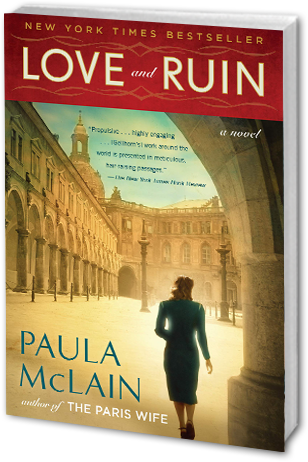Reader’s Guide Questions
1) Martha tells us from the outset that, for better or worse, she is a born traveler. What kind of expectation does that set up about her personality and disposition? What character traits might “born travelers” have that others don’t?
2) Just before Martha meets Ernest, her father dies. How might that make her more impressionable or susceptible to Ernest’s influence?
3) How would you describe Martha’s outlook as she heads off to Madrid? What are her reasons for going? What did the war seem to mean to her, and to others who volunteered?
4) When Martha begins to feel Ernest is drawn to her physically, she initially resists, saying he’s “too Hemingway.” What does she mean by that? What is she afraid of?
5) Martha tells us that after three weeks in Madrid she felt she never wanted to leave, saying, “It was like living with my heart constantly in my throat.” How could that feeling be perceived as positive? What are some of things she loves about Spain? About her circle of friends and colleagues at the Hotel Florida?
6) When Martha finds the house in Cuba, the Finca Vigía, she falls in love with it instantly, even though it’s in ruins. Why? What does she hope to gain by restoring the property and living there with Ernest? What are the risks?
7) When Martha accepts the assignment to travel to Finland for Collier’s, Ernest says teasingly to their group of friends in Sun Valley that she’s abandoning him. Is it really a joke or is there significant tension brewing? What are Martha’s reasons for going? How does she feel about her work in relation to her personal life? Can the two coexist? Can she—or anyone—have everything?
8) Though Martha is the one who chooses the Finca as a “beautiful foxhole” to share with Ernest, the house eventually begins to weigh on her. Why? What is draining to her about domesticity? Does Ernest have the same ambivalence? Why or why not?
9) Although Martha loves Ernest and doesn’t want to give up her life with him, she has a lot of trepidation about marrying him. Why? What factors contribute to her anxiety? What does she stand to lose?
10) When For Whom the Bell Tolls is published in 1940, it’s a runaway success, selling more copies than any American novel before it save Gone with the Wind. How do the book’s success and Ernest’s intensifying fame challenge Martha as his wife? What about as a writer?
11) When Martha and Ernest go off to China, they’re both working as reporters in search of a story. How do their journalistic methods differ? Are they different kinds of travelers, with different worldviews? Would you say they’re compatible? Why or why not?
12) As the world plunges toward war, Martha feels increasingly compelled to go to Europe to try to write about what’s happening, while Ernest becomes obsessed with his sub-hunting “mission.” What are the instincts that pull them in opposite directions? Do we understand what drives them? Do they understand and have compassion for each other, or are they spiraling toward an impasse?
13) When Martha is finally convinced she must go to Europe to report on the war if she’s going to live with herself, Ernest feels more and more despondent and abandoned. Finally, he betrays her by taking her correspondent’s credentials from Collier’s, effectively replacing her on the masthead and making a place at the front lines impossible for her. Can we comprehend his actions and find empathy for him? Why or why not?
14) When the marriage disintegrates beyond repair, Ernest almost immediately finds a new love interest in Mary Welsh (who will become Mrs. Hemingway #4), while Martha turns to her work to ease her pain, finding strength in reclaiming her name and her independence. Do you think their contrasting strategies for surviving heartbreak symbolize the essential differences between Martha and Ernest as people? And do you believe that two such very different personalities could ever hope to find lasting happiness together?
